sadd rang meri mauj hay, main tab’ey rawaa’n hoon
This verse always crosses my mind whenever the name of Ibn-e-Insha is mentioned around. A poet, columnist, humorist, and travelogue writer loved for past five decades by Urdu language readers around the globe.
I still remember the first time I got introduced to Insha Ji’s witty writings. Twelve or thirteen years back while going through my sister’s Urdu text book, I came across a lesson taken from a strangely named book “Urdu Ki Aakhri Kitabâ€. The name of book was catchy enough for me, I read the whole lesson within few minutes. From then on, there was no stopping to the admiration nurtured within me for this great unique writer.
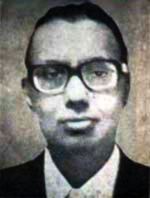 Born as Sher Muhammad Khan on June 15, 1927 in Jalandhar (Indian Punjab), he did his BA from Punjab University and MA from Urdu College Karachi (Federal Urdu University of now). Then, remained associated with Radio Pakistan – a strong medium of Mass Communication in 50’s and 60’s. Later, he joined UN for some time and from that association came the travelogues widely read and liked, such as Awara Gard ki Diary, Duniya Gol Hay, Ibn e Batuta kay Taa’qub May, Chaltay ho tu Cheen ko Chaliyay and Nagri Nagri Phira Musafir.
Born as Sher Muhammad Khan on June 15, 1927 in Jalandhar (Indian Punjab), he did his BA from Punjab University and MA from Urdu College Karachi (Federal Urdu University of now). Then, remained associated with Radio Pakistan – a strong medium of Mass Communication in 50’s and 60’s. Later, he joined UN for some time and from that association came the travelogues widely read and liked, such as Awara Gard ki Diary, Duniya Gol Hay, Ibn e Batuta kay Taa’qub May, Chaltay ho tu Cheen ko Chaliyay and Nagri Nagri Phira Musafir.
Changing the trends of Urdu travelogue writing, he encompassed cultural trends and various interesting traits of people living all around, introduced us to Japan, UK, USA, Malaysia, Russia (Soviet Union), India, Turkey, France, China, Iran, and others, in a detailed manner; but not forgetting to maintain the humor.
Sharing an enlightening excerpt from his last travelogue “Nagri Nagri Phirra Musafirâ€:
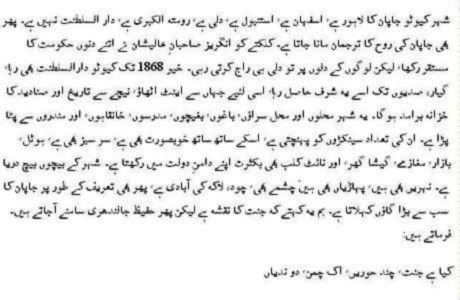
His observation and the ability to capture picture-perfectly in travelogues is remarkable. I havent been to Japan, havent seen much in pictures too; still it seems a place visited.
Muhtaq Ahmad Yusufi once said of Ibn-e-Insha:
“Yah unkay mazaah ka karishma nahi’n tu kiya hay kay unhon nay al’aam e siyasat ko bhi saada dil bandon kay liyay aaasan bana diyya.â€
And how true. Ibn-e-Insha wrote for masses – the common man.
Interestingly, you’ll find his prose and poetry starkly opposite to each other. The poet of famous ghazals as “Insha Ji utho Abb kooch karo†and “Kal chaudhween ki raat thi, shab bhar raha charcha tera†kept the gloom and dark side of life in his poetry. His poetry collections, Iss basti kay ikk koochay may, Chand Nagar, and Dil-e-Wahshi are filled with turns of life: flavors of love added in. A roller-coaster ride of emotions.
A poet of unique placement in Urdu Literature but when you open the prose, you will find yourself in an altogether different world. He touched common topics from my life and your life, left us to laugh for few minutes and thoughts for hours.
In Urdu ki Aakhri Kitab (which remains one of my most favorite books), he introduces us to the “geographical†situation of Pakistan like this:

ironically the research continues. We’re still facing the same challenges, and suffering from same hurdles, differences. A topic ATP has touched and discussed at length in previous many months. I wonder if Ibn-e-Insha was foreseeing the destabilized nation and country.
Moving on to another excerpt (from Khumar-e-Gandum), a research associate once asked Ibn-e-Insha about his Family Tree (shajrah-e-nasb) and that’s what he tells:
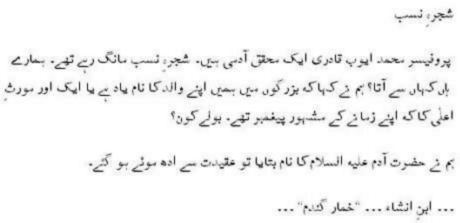
In Nagri Nagri Phira Musafir, Ibn-e-Insha’s last of the books, his last letter to his readers is also included. Khalid Hasan, one of his friends and renowned columnist, shares it like this:
“The other day, we had barely had that tube they have stuck in our nostrils taken out, when in walked Faiz sahib who is in London. If there was to be some certainty that Faiz sahib will come to look you up, that is reason enough to undergo an operation … There is nothing to surgery these days. Even if you don’t need it, doctors perform it out of a sense of fun. There was this gentleman with a cough who went to pick up a linctus. The doctor operated his calf instead. And while it is true that the pain in his calf became a permanent feature thereafter, the cough disappeared completely … There is an array of buttons at the bottom of our bed about whose precise use we remain in the dark. Whenever we have attempted to push one of them, the result has invariably been contrary to what we intended. Often, by mistake when we press something, a machine comes to life. Result? The head gets lowered while our feet point skywards. This is a veritable devil’s workshop. In our hospitals at home, all they have is a simple winding mechanism. Even more surefire is the method whereby a couple of bricks are placed under the feet of the end that needs to be raised. In the event that no bricks are at hand, books can do nicely. Under one foot of the bed you have ‘Behishti Zaiwar’ and under the other ‘Alipur ka Aili’. Obviously books have their uses.â€
Insha in Zia Moheyuddin‘s voice …!
As, I’m writing this post, my mind’s filtering a fortune of his writings, different angles to life in his perception and the way pen related it to us; all that I want to share here but I’m afraid Ibn e Insha is too giant of a personality to be covered in one single post. His columns written in 60’s and 70’s stand firm even now, telling the same day-to-day problems a common Pakistani faces.
 Decades passed, new generation grew up in the country, read his book and thought the same way. It’s interesting for every generation when they find how the writer had written something that fits the current situation in the country. Since 70’s, so many things have changed in our country: the ever-rising poverty line, out of reach commodity prices, differences in name of religion and faiths, social frustration. Still, not to forget so many positive things that have changed the outlook of Pakistan; the infrastructural advancements, varying industries, telecom boom, flourishing IT, competent financial institutions. Our generation, though decades old, extracts the same essence from his writings. Look around the social or political problems in Pakistan, it seems everything is in stand-sill state.
Decades passed, new generation grew up in the country, read his book and thought the same way. It’s interesting for every generation when they find how the writer had written something that fits the current situation in the country. Since 70’s, so many things have changed in our country: the ever-rising poverty line, out of reach commodity prices, differences in name of religion and faiths, social frustration. Still, not to forget so many positive things that have changed the outlook of Pakistan; the infrastructural advancements, varying industries, telecom boom, flourishing IT, competent financial institutions. Our generation, though decades old, extracts the same essence from his writings. Look around the social or political problems in Pakistan, it seems everything is in stand-sill state.
Its utter hard for anyone to do justice with his poetry and prose in one post. His humor with a unique flavor of satire, undoubtedly, moves your heart in a strange way. Richness of his thoughts and sheer simplicity to reflect them makes Insha what he was and what he is now. By reading him, I met a Pakistani, who gets saddened at the same reasons I find disturbing but Ibn e Insha had the knack to wrap the bitter in sweet. Ending on his dua :
Ya Allah! Khanay ko Roti Day
Pahananay Ko kapra day
rahnay ko Makaan day
Izzat aur Assodgi ki zindagi day
Mian Yah bhi koi manganay ki cheez hay,
Khuch aur maanga kar!
Baba ji aap kiya mangatay hain?
Main?
May yah cheezein nahi mangata.
May tu kahta hoon Allah miyan mujhay Iiman day,
naik amal karnay ki tofeeq day!
Baba ji aap theek maangtay hain
Insaan wohi cheez tu mangta hay
Jo uskay paas nahi hoti.
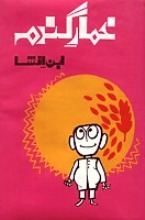
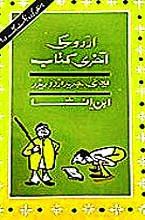
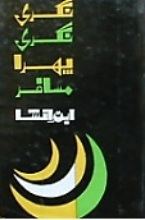



















































Thank you Owais Mughal Saheb for liking my article on Insha ji.
Faisal Haneef Saheb, thanks for sharing analysis on Ibn-e-Insha here. i find your comment very informative.